Highlighting timeless tales, 'Stories About Gratitude in the Bible' reveals the profound impact of thankfulness through ancient narratives that inspire today.

Stories About Gratitude in the Bible
In a world where you can express gratitude with a quick text, the timeless stories of gratitude in the Bible stand out as profound reminders of what it truly means to be thankful.
You'll find tales ranging from the ten lepers healed by Jesus, showcasing the power of giving thanks even when it seems everyone else has forgotten, to King David's psalms, which echo gratitude through the ages.
Each story, whether it's about Hannah's heartfelt prayer of thanks or the miraculous feeding of the five thousand, offers a unique lens on gratitude's role in human life.
As you reflect on these narratives, you'll uncover layers of meaning that might just transform your understanding of thankfulness.
Key Takeaways
- Biblical tales highlight gratitude's role in fostering spiritual growth and divine favor.
- Expressions of thankfulness often follow transformative miracles and divine interventions.
- Gratitude transcends societal barriers, leading to community involvement and shared blessings.
- Stories emphasize the importance of acknowledging God's sovereignty and trusting in His guidance through gratitude.
The Ten Lepers Healed
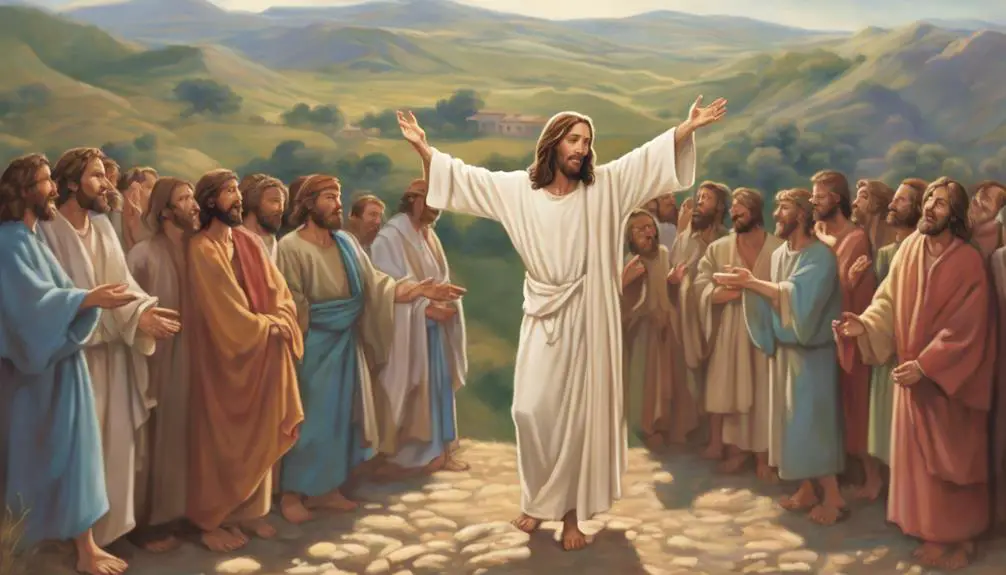
In the narrative of the Ten Lepers Healed, detailed in the Gospel of Luke, we observe a profound exploration of gratitude through the actions and responses of the lepers upon their miraculous healing. This story not only highlights the transformative power of Jesus' miracles but also delves into the societal implications of leprosy stigma.
Leprosy, a condition marred by physical deformities and social ostracization, rendered its sufferers untouchable and marginalized. The miraculous healing, therefore, wasn't merely a restoration of physical health but a reintegration into society, breaking the chains of stigma that bound them.
The lepers' initial plea for mercy is a testament to their desperation and awareness of their marginalized status. When healed, their reaction—save for one—underscores a common human oversight: taking profound blessings for granted. The sole leper who returns to express gratitude embodies the essence of true appreciation, recognizing the magnitude of the miracle that transcended physical healing to challenge societal norms.
This account prompts a reflection on the depth of our gratitude, especially in the face of life-altering experiences that not only heal but also restore dignity and belonging, challenging us to transcend mere acknowledgment towards a deeper, more profound appreciation.
Hannah's Prayer of Thanks

Hannah's Prayer of Thanks, detailed in the First Book of Samuel, exemplifies a heartfelt expression of gratitude towards divine intervention in a period of deep personal despair. This story isn't just a narrative; it's a complex exploration of faith, promise, and the power of a mother's devotion. When you delve into Hannah's journey, you find a rich tapestry of themes and lessons that continue to resonate today.
- Barrenness Overcome: Hannah's initial plight is one of barrenness, a deeply distressing situation in her time. Her eventual conception is seen not just as a personal victory but a divine affirmation.
- Vow to God: Hannah's promise to dedicate her son to God's service underscores the depth of her faith and her understanding of gratitude. It's a profound act of thanksgiving and submission.
- Divine Intervention: The story highlights the belief in God's active role in the lives of believers, responding to their pleas in times of need.
- Mother's Devotion: Hannah's dedication is evident in her willingness to give up her son, Samuel, in fulfillment of her vow—a testament to her deep faith and gratitude.
- Prayer of Thanks: Her prayer encapsulates a powerful acknowledgment of God's sovereignty and her gratitude for His intervention.
Through Hannah's story, you're invited to reflect on the themes of faith, promise, and gratitude, woven together by a mother's unwavering devotion and the joy of a barrenness overcome.
King David's Psalms of Gratitude
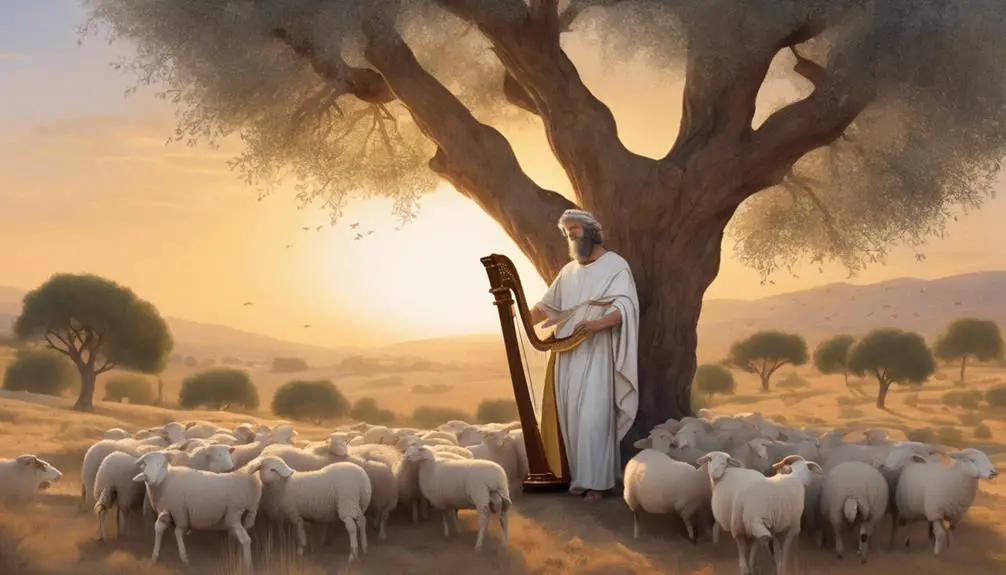
Just as Hannah expressed her profound gratitude through prayer, King David's Psalms similarly reveal a deep-seated appreciation for divine favor and guidance. His compositions serve as an exemplar of heartfelt worship, showcasing an intimate relationship with the divine, punctuated by moments of divine interventions. David's psalms aren't mere poetic musings; they're theological reflections that encapsulate gratitude amidst trials and triumphs.
Analyzing these psalms, you'll notice a thematic recurrence: David frequently acknowledges God's hand in his life, attributing his successes and deliverance from peril to divine intervention. For instance, Psalm 9 resonates with thanksgiving for God's justice, while Psalm 23, arguably his most famous, expresses trust and gratitude for God's guidance and provision. These texts aren't only liturgical but also deeply personal, reflecting David's reliance on God throughout his tumultuous life.
Moreover, David's gratitude extends beyond personal blessings. He thanks God for His covenantal faithfulness to Israel, demonstrating an understanding that gratitude encompasses both individual and communal blessings. Through his psalms, David models how to engage in a relationship with God marked by gratitude, recognizing divine interventions in both the mundane and the miraculous.
Jesus Feeds the Five Thousand
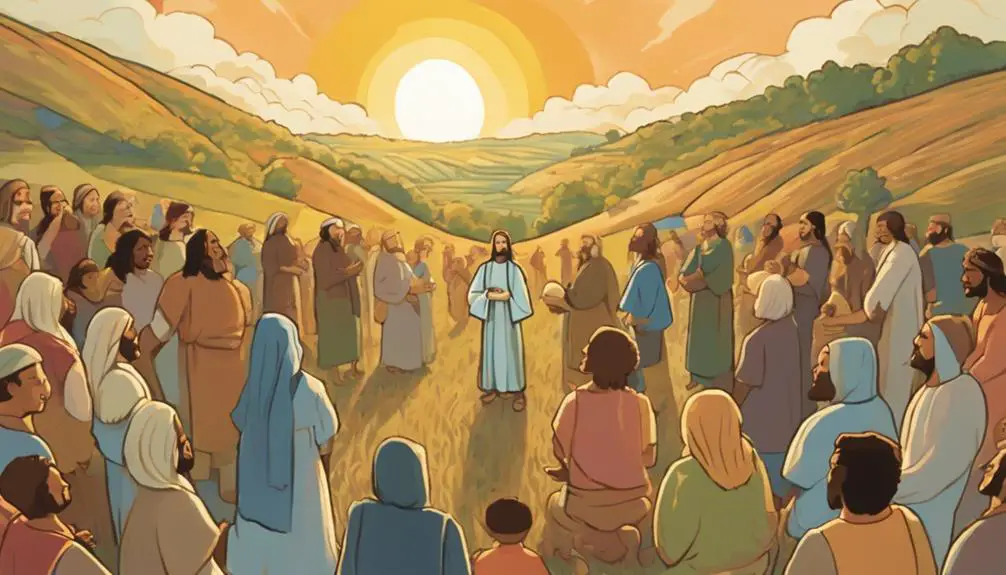
Analyzing the miracle where Jesus feeds the five thousand, we uncover a profound narrative of gratitude and divine provision embedded within the texts of the New Testament. This event isn't merely a display of Christ's ability to perform wonders but serves as a rich text for miracle analysis and understanding the symbolism of provision.
- Scarcity to Abundance: The initial scarcity of five loaves and two fish contrasts starkly with the subsequent abundance, illustrating the transformative power of divine intervention.
- Gratitude Before Provision: Jesus' act of giving thanks before the multiplication highlights the importance of gratitude as a precursor to receiving.
- Community Involvement: The disciples' role in distributing and gathering leftovers signifies the collective participation in the miracle, emphasizing community and shared blessings.
- Symbolism of Provision: The provision of physical nourishment parallels spiritual sustenance, suggesting that divine care extends beyond material needs.
- Test of Faith: The disciples' skepticism and the subsequent miracle serve as a test and reinforcement of faith, underlining the narrative's deeper theological implications.
This detailed analysis reveals the layers of gratitude and divine provision symbolized in the miracle, offering insights into the nuanced interplay of faith, thankfulness, and divine intervention in the Bible.
The Thankful Samaritan Woman
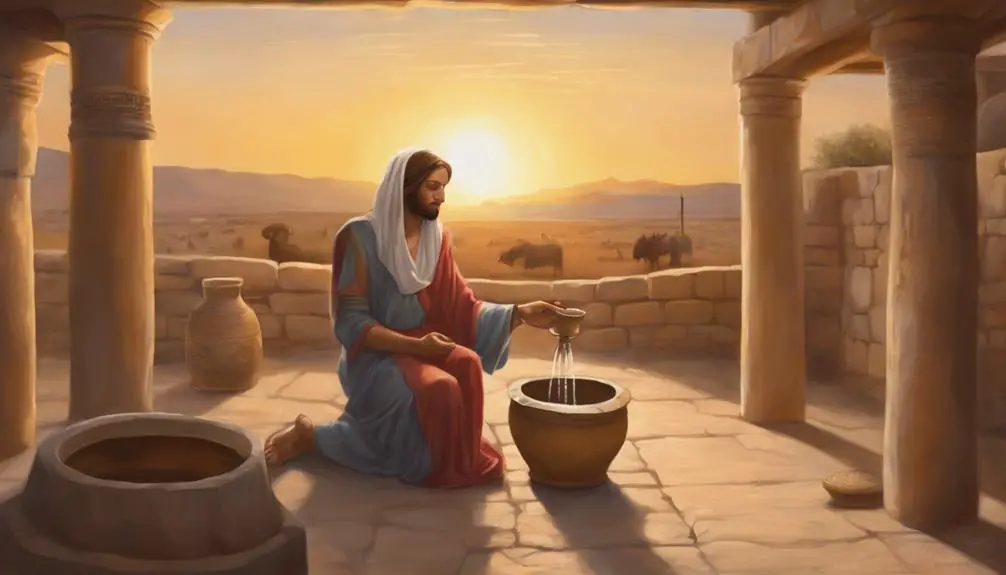
In the narrative of the Samaritan woman at the well, we encounter a profound expression of gratitude that emerges from an unexpected interaction with Jesus, shedding light on themes of revelation, acceptance, and transformation. This story, deeply embedded in the cultural and historical context of the time, highlights the breaking down of cultural barriers. Jesus, a Jew, engages in conversation with a Samaritan woman, an act that defies the prevailing societal norms. The dialogue that unfolds isn't only a testament to the transcendence of divine love over human divisions but also a pivotal moment of personal insight for the woman.
Central to their exchange is the concept of 'living water,' a metaphor for the spiritual nourishment and eternal life that Jesus offers. The woman's initial misunderstanding of this term eventually gives way to a deeper realization of its spiritual significance, leading to her transformation. Her gratitude isn't explicitly stated but is profoundly implied through her actions following the encounter. She becomes a herald, eagerly sharing her experience with others in her community, thus emphasizing the transformative power of gratitude.
This story underscores the idea that true gratitude often follows an expansive understanding of one's spiritual journey, transcending mere acknowledgment to become a catalyst for change and outreach.
Frequently Asked Questions
How Does the Concept of Gratitude in the Bible Differ From Gratitude in Other Religious Texts?
When you explore gratitude comparisons across religious texts, you'll notice distinct nuances.
Unlike other faiths, the Bible often frames gratitude as a direct response to divine grace and blessings, emphasizing a personal relationship with God.
Religious contrasts further highlight that while some traditions may focus on gratitude for material or worldly blessings, Biblical gratitude leans heavily on spiritual salvation and the benevolence of God, setting a unique tone for thankfulness in its narratives.
Can the Act of Expressing Gratitude in the Bible Be Linked to Any Psychological Benefits Today?
Absolutely, expressing gratitude can be linked to psychological benefits today. Imagine the warmth of a heartfelt 'thank you' lighting up your brain's reward pathways.
Gratitude psychology dives deep into this, showing how thankfulness therapy can enhance mental health, reducing symptoms of depression and anxiety.
Are There Any Biblical Stories That Caution Against the Misuse or Lack of Gratitude?
Yes, there are narratives warning against the misuse or absence of gratitude, highlighting gratitude punishments and unthankful consequences. Analyzing these stories can reveal a profound psychological insight: lacking gratitude isn't just a moral failing but can lead to tangible repercussions.
This concept mirrors modern psychological findings, where gratitude is linked to better mental health outcomes. Thus, these stories offer not only moral but also practical lessons for today's life.
How Do Biblical Teachings on Gratitude Influence Modern-Day Practices in Christian Communities?
You'll find that biblical teachings on gratitude deeply influence modern Christian communities. Like a river nourishing a vast garden, these teachings flow into the practices and rituals that shape daily life.
Community rituals and gratitude practices aren't just traditions; they're the embodiment of these teachings. They encourage collective and individual expressions of thankfulness, reinforcing the importance of gratitude in maintaining a vibrant, supportive, and spiritually enriched community environment.
In What Ways Do Non-Christian Scholars Interpret the Theme of Gratitude in Biblical Narratives?
Non-Christian scholars often approach the theme of gratitude in biblical narratives through lenses of historical context and cultural interpretations. They dissect how gratitude was understood and expressed in ancient societies, contrasting it with modern perceptions.
Conclusion
In analyzing these biblical narratives, you encounter a tapestry where threads of gratitude are intricately woven into the fabric of faith. Each story, from the ten lepers to the thankful Samaritan woman, symbolizes a unique shade of thankfulness, revealing its transformative power.
These narratives encourage you to perceive gratitude not merely as an act, but as a sacred echo resonating through the chambers of the human heart, compelling it towards a deeper communion with the divine. This exploration underscores gratitude's pivotal role in spiritual enlightenment and growth.

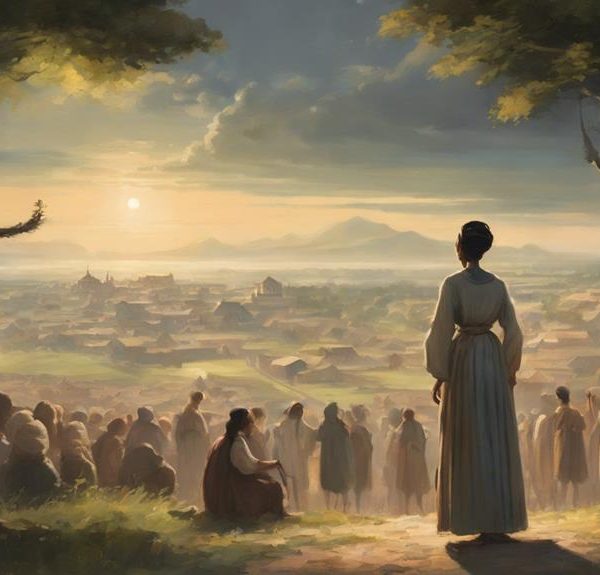
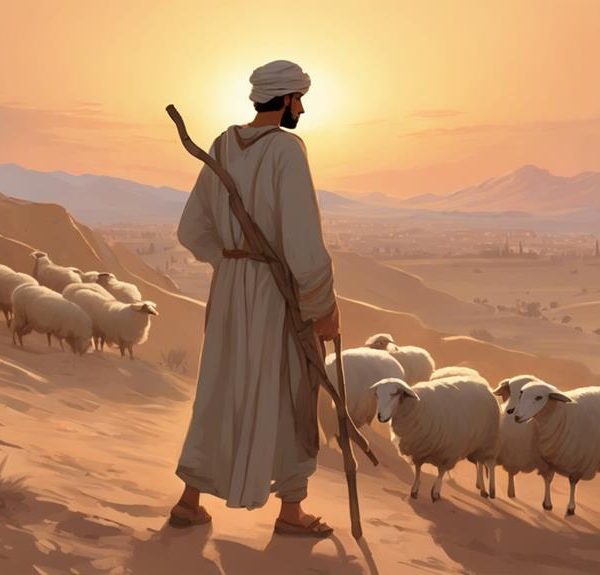
Sign up